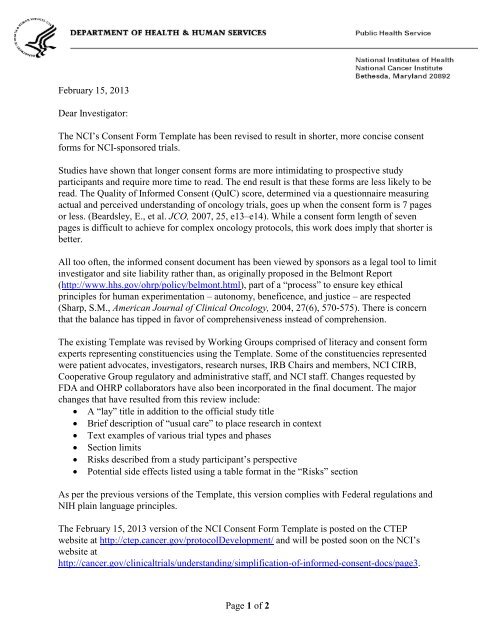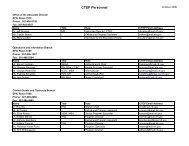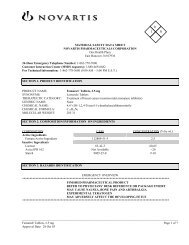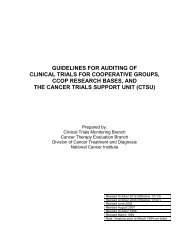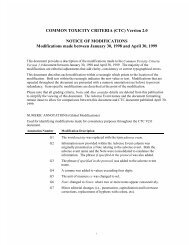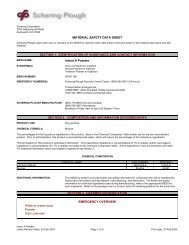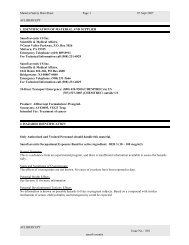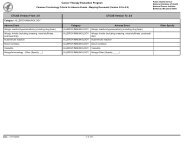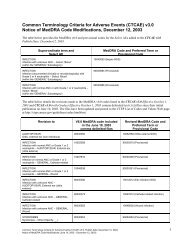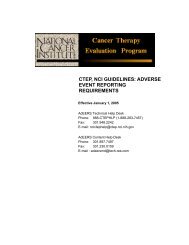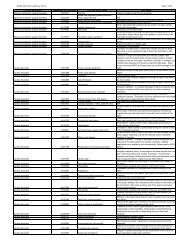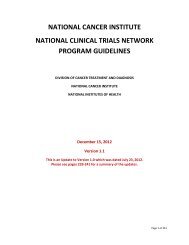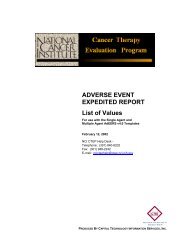Cover Letter for NCI Consent Form Template - Cancer Therapy ...
Cover Letter for NCI Consent Form Template - Cancer Therapy ...
Cover Letter for NCI Consent Form Template - Cancer Therapy ...
Create successful ePaper yourself
Turn your PDF publications into a flip-book with our unique Google optimized e-Paper software.
February 15, 2013<br />
Dear Investigator:<br />
The <strong>NCI</strong>’s <strong>Consent</strong> <strong>Form</strong> <strong>Template</strong> has been revised to result in shorter, more concise consent<br />
<strong>for</strong>ms <strong>for</strong> <strong>NCI</strong>-sponsored trials.<br />
Studies have shown that longer consent <strong>for</strong>ms are more intimidating to prospective study<br />
participants and require more time to read. The end result is that these <strong>for</strong>ms are less likely to be<br />
read. The Quality of In<strong>for</strong>med <strong>Consent</strong> (QuIC) score, determined via a questionnaire measuring<br />
actual and perceived understanding of oncology trials, goes up when the consent <strong>for</strong>m is 7 pages<br />
or less. (Beardsley, E., et al. JCO, 2007, 25, e13–e14). While a consent <strong>for</strong>m length of seven<br />
pages is difficult to achieve <strong>for</strong> complex oncology protocols, this work does imply that shorter is<br />
better.<br />
All too often, the in<strong>for</strong>med consent document has been viewed by sponsors as a legal tool to limit<br />
investigator and site liability rather than, as originally proposed in the Belmont Report<br />
(http://www.hhs.gov/ohrp/policy/belmont.html), part of a “process” to ensure key ethical<br />
principles <strong>for</strong> human experimentation – autonomy, beneficence, and justice – are respected<br />
(Sharp, S.M., American Journal of Clinical Oncology, 2004, 27(6), 570-575). There is concern<br />
that the balance has tipped in favor of comprehensiveness instead of comprehension.<br />
The existing <strong>Template</strong> was revised by Working Groups comprised of literacy and consent <strong>for</strong>m<br />
experts representing constituencies using the <strong>Template</strong>. Some of the constituencies represented<br />
were patient advocates, investigators, research nurses, IRB Chairs and members, <strong>NCI</strong> CIRB,<br />
Cooperative Group regulatory and administrative staff, and <strong>NCI</strong> staff. Changes requested by<br />
FDA and OHRP collaborators have also been incorporated in the final document. The major<br />
changes that have resulted from this review include:<br />
A “lay” title in addition to the official study title<br />
Brief description of “usual care” to place research in context<br />
Text examples of various trial types and phases<br />
Section limits<br />
Risks described from a study participant’s perspective<br />
Potential side effects listed using a table <strong>for</strong>mat in the “Risks” section<br />
As per the previous versions of the <strong>Template</strong>, this version complies with Federal regulations and<br />
NIH plain language principles.<br />
The February 15, 2013 version of the <strong>NCI</strong> <strong>Consent</strong> <strong>Form</strong> <strong>Template</strong> is posted on the CTEP<br />
website at http://ctep.cancer.gov/protocolDevelopment/ and will be posted soon on the <strong>NCI</strong>’s<br />
website at<br />
http://cancer.gov/clinicaltrials/understanding/simplification-of-in<strong>for</strong>med-consent-docs/page3.<br />
Page 1 of 2
The dedicated ef<strong>for</strong>ts of the Working Group members who prepared this version of the <strong>Template</strong><br />
are greatly appreciated. Their names are also posted on the CTEP website. Additional helpful<br />
documents posted on the CTEP website, in the “In<strong>for</strong>med <strong>Consent</strong>” section found under the<br />
“Protocol Development” tab include:<br />
<strong>Consent</strong> <strong>for</strong>m example <strong>for</strong> a Phase 2 treatment trial, written using revised <strong>Template</strong><br />
<strong>Consent</strong> <strong>for</strong>m example <strong>for</strong> a Phase 3 treatment trial, written using revised <strong>Template</strong><br />
<strong>Letter</strong> of rationale addressed to IRB Chairs and Members<br />
Instructions <strong>for</strong> building “Tables of Possible Side Effects”<br />
<strong>NCI</strong> Scientific Term CTCAE – IC Term Spreadsheet 12-12-12<br />
Repository of “Tables” <strong>for</strong> commonly-used commercials drugs<br />
Repository of “Tables” <strong>for</strong> commonly-used regimens (to be added within the year)<br />
CTEP will begin using the February 15, 2013 version of the <strong>Template</strong> <strong>for</strong> review of your consent<br />
<strong>for</strong>m documents as of May 15, 2013. Please utilize the February 15, 2013 version of the<br />
<strong>Template</strong> to guide preparation of consent <strong>for</strong>m documents on all new protocol submissions to<br />
<strong>NCI</strong> as soon as possible.<br />
Your support of more concise consent <strong>for</strong>ms is appreciated and assists the <strong>NCI</strong> to better in<strong>for</strong>m<br />
prospective study participants.<br />
Best regards,<br />
Jeffrey Abrams, M.D.<br />
Associate Director, <strong>Cancer</strong> <strong>Therapy</strong> Evaluation Program<br />
Acting Director <strong>for</strong> Clinical Research<br />
Division of <strong>Cancer</strong> Treatment and Diagnosis<br />
National <strong>Cancer</strong> Institute<br />
Page 2 of 2


